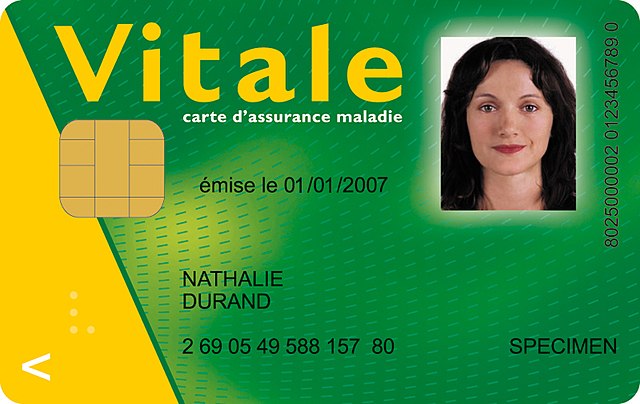Health card
Comprehensive capture and extraction of Health cards.
Verification of Health cards is essential for onboarding new customers to insurance products. It is also required for human resource and health-related sectors. The health card can be used to confirm the identity of an individual. This is vital for preventing identity fraud and building trust with your customers.
Introduction
Datakeen's OCR service automatically extracts information from French Health Cards.
- Information is captured as structured data and can be extracted as a .json file through our API.

Extracted information |
|---|
|
The synchronous API model extracts data from health cards in real time.
API token is requiredIn order to perform any call, you will need an API token that can be retrieved thanks your API credentials. To learn about authentification, please refer to this page
curl --request POST \
--url https://api.datakeen.co/api/v1/reco/vital-card \
--header 'accept: application/json' \
--header 'content-type: application/json'npm install api --save
const sdk = require('api')('@datakeen/v1.4.0#ax268r1ilnd0liqe');
sdk.postRecoVitalCard()
.then(({ data }) => console.log(data))
.catch(err => console.error(err));require 'uri'
require 'net/http'
url = URI("https://api.datakeen.co/api/v1/reco/vital-card")
http = Net::HTTP.new(url.host, url.port)
http.use_ssl = true
request = Net::HTTP::Post.new(url)
request["accept"] = 'application/json'
request["content-type"] = 'application/json'
response = http.request(request)
puts response.read_body<?php
require_once('vendor/autoload.php');
$client = new \GuzzleHttp\Client();
$response = $client->request('POST', 'https://api.datakeen.co/api/v1/reco/vital-card', [
'headers' => [
'accept' => 'application/json',
'content-type' => 'application/json',
],
]);
echo $response->getBody();python -m pip install requests
import requests
url = "https://api.datakeen.co/api/v1/reco/vital-card"
headers = {
"accept": "application/json",
"content-type": "application/json"
}
response = requests.post(url, headers=headers)
print(response.text)CURL *hnd = curl_easy_init();
curl_easy_setopt(hnd, CURLOPT_CUSTOMREQUEST, "POST");
curl_easy_setopt(hnd, CURLOPT_WRITEDATA, stdout);
curl_easy_setopt(hnd, CURLOPT_URL, "https://api.datakeen.co/api/v1/reco/vital-card");
struct curl_slist *headers = NULL;
headers = curl_slist_append(headers, "accept: application/json");
headers = curl_slist_append(headers, "content-type: application/json");
curl_easy_setopt(hnd, CURLOPT_HTTPHEADER, headers);
CURLcode ret = curl_easy_perform(hnd);dotnet add package RestSharp
using RestSharp;
var options = new RestClientOptions("https://api.datakeen.co/api/v1/reco/vital-card");
var client = new RestClient(options);
var request = new RestRequest("");
request.AddHeader("accept", "application/json");
request.AddHeader("content-type", "application/json");
var response = await client.PostAsync(request);
Console.WriteLine("{0}", response.Content);CURL *hnd = curl_easy_init();
curl_easy_setopt(hnd, CURLOPT_CUSTOMREQUEST, "POST");
curl_easy_setopt(hnd, CURLOPT_WRITEDATA, stdout);
curl_easy_setopt(hnd, CURLOPT_URL, "https://api.datakeen.co/api/v1/reco/vital-card");
struct curl_slist *headers = NULL;
headers = curl_slist_append(headers, "accept: application/json");
headers = curl_slist_append(headers, "content-type: application/json");
curl_easy_setopt(hnd, CURLOPT_HTTPHEADER, headers);
CURLcode ret = curl_easy_perform(hnd);(require '[clj-http.client :as client])
(client/post "https://api.datakeen.co/api/v1/reco/vital-card" {:content-type :json
:accept :json})package main
import (
"fmt"
"net/http"
"io"
)
func main() {
url := "https://api.datakeen.co/api/v1/reco/vital-card"
req, _ := http.NewRequest("POST", url, nil)
req.Header.Add("accept", "application/json")
req.Header.Add("content-type", "application/json")
res, _ := http.DefaultClient.Do(req)
defer res.Body.Close()
body, _ := io.ReadAll(res.Body)
fmt.Println(string(body))
}POST /api/v1/reco/vital-card HTTP/1.1
Accept: application/json
Content-Type: application/json
Host: api.datakeen.coOkHttpClient client = new OkHttpClient();
Request request = new Request.Builder()
.url("https://api.datakeen.co/api/v1/reco/vital-card")
.post(null)
.addHeader("accept", "application/json")
.addHeader("content-type", "application/json")
.build();
Response response = client.newCall(request).execute();const options = {
method: 'POST',
headers: {accept: 'application/json', 'content-type': 'application/json'}
};
fetch('https://api.datakeen.co/api/v1/reco/vital-card', options)
.then(response => response.json())
.then(response => console.log(response))
.catch(err => console.error(err));val client = OkHttpClient()
val request = Request.Builder()
.url("https://api.datakeen.co/api/v1/reco/vital-card")
.post(null)
.addHeader("accept", "application/json")
.addHeader("content-type", "application/json")
.build()
val response = client.newCall(request).execute()#import <Foundation/Foundation.h>
NSDictionary *headers = @{ @"accept": @"application/json",
@"content-type": @"application/json" };
NSMutableURLRequest *request = [NSMutableURLRequest requestWithURL:[NSURL URLWithString:@"https://api.datakeen.co/api/v1/reco/vital-card"]
cachePolicy:NSURLRequestUseProtocolCachePolicy
timeoutInterval:10.0];
[request setHTTPMethod:@"POST"];
[request setAllHTTPHeaderFields:headers];
NSURLSession *session = [NSURLSession sharedSession];
NSURLSessionDataTask *dataTask = [session dataTaskWithRequest:request
completionHandler:^(NSData *data, NSURLResponse *response, NSError *error) {
if (error) {
NSLog(@"%@", error);
} else {
NSHTTPURLResponse *httpResponse = (NSHTTPURLResponse *) response;
NSLog(@"%@", httpResponse);
}
}];
[dataTask resume];opam install cohttp-lwt-unix cohttp-async
open Cohttp_lwt_unix
open Cohttp
open Lwt
let uri = Uri.of_string "https://api.datakeen.co/api/v1/reco/vital-card" in
let headers = Header.add_list (Header.init ()) [
("accept", "application/json");
("content-type", "application/json");
] in
Client.call ~headers `POST uri
>>= fun (res, body_stream) ->
(* Do stuff with the result *)$headers=@{}
$headers.Add("accept", "application/json")
$headers.Add("content-type", "application/json")
$response = Invoke-WebRequest -Uri 'https://api.datakeen.co/api/v1/reco/vital-card' -Method POST -Headers $headerslibrary(httr)
url <- "https://api.datakeen.co/api/v1/reco/vital-card"
response <- VERB("POST", url, content_type("application/json"), accept("application/json"))
content(response, "text")import Foundation
let headers = [
"accept": "application/json",
"content-type": "application/json"
]
let request = NSMutableURLRequest(url: NSURL(string: "https://api.datakeen.co/api/v1/reco/vital-card")! as URL,
cachePolicy: .useProtocolCachePolicy,
timeoutInterval: 10.0)
request.httpMethod = "POST"
request.allHTTPHeaderFields = headers
let session = URLSession.shared
let dataTask = session.dataTask(with: request as URLRequest, completionHandler: { (data, response, error) -> Void in
if (error != nil) {
print(error as Any)
} else {
let httpResponse = response as? HTTPURLResponse
print(httpResponse)
}
})
dataTask.resume()
Sending multiple documentsScans, pictures and documents should be sent one by one. If you want to send multiple scans at the same time, please refer to the multi-docs API.
API Response
An instance of the usual response is displayed in the following JSON. You will find the complete information, including extraction and checks. More detailed examples of each extracted field are given below.
{
"extractedInformation": {
"firstName": {
"confidence": 1,
"value": "Paul"
},
"issueDate": {
"confidence": 1,
"value": "05/01/2021"
},
"lastName": {
"confidence": 1,
"value": "DUPOND"
},
"nSS": {
"confidence": 1,
"value": "148078515222222"
}
},
"message": "",
"status": 200
}Extracted information format
For each field, the confidence value indicates the degree of certainty of the extraction with regard to the data on the card.
Name
The lastName (key) of the card holder is returned as a string (value).
| lastName | Value |
|---|---|
| value | string |
| confidence | number |
"lastName": {
"confidence": 1,
"value": "DUPOND"
}Surname
The firstName (key) of the card holder is returned as a string (value).
| firstName | Value |
|---|---|
| value | string |
| confidence | number |
"firstName": {
"confidence": 1,
"value": "Paul"
}Delievry date
The issueDate (key) of the card holder is returned as a string (value).
| issueDate | Value |
|---|---|
| value | string |
| confidence | number |
"issueDate": {
"confidence": 1,
"value": "05/01/2021"
}Social insurance number
The nSS (key) of the card holder is returned as a string (value).
| nSS | Value |
|---|---|
| value | string |
| confidence | number |
"nSS": {
"confidence": 1,
"value": "148078515222222"
}Additional information
Loaded scans must pass prerequisitesTo provide a qualitative service and a comprehensive data capture, every picture, scan, or document sent to our API must comply with determined prerequisites which can be found on this page
API limitations
- Maximum size : 5 MB
- Maximum number of calls per minute : 10 calls
Updated 3 months ago
Ready to process health cards ? See our API Reference for detailed information
